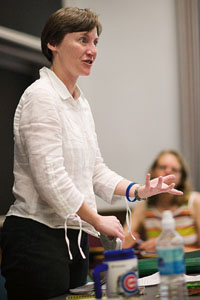Holly Swyers, Collegiate Assistant Professor and Katharine Graham Fellow in the Social Sciences
By William HarmsNews Office
 Holly Swyers | |
While many students travel the globe to conduct ethnographic research, students also can learn to do such research close to home, says anthropologist Holly Swyers, a Collegiate Assistant Professor.
“I teach an ethnographic methods class, and I have my students do projects in the city of Chicago,” says Swyers, who is a Katharine Graham Fellow in the Social Sciences in the Society of Fellows.
“It’s part of a process John Comaroff (the Harold H. Swift Distinguished Service Professor in Anthropology) calls ‘making the familiar strange.’ What I do is show students how to gain new insights into things they look at all the time,” says Swyers. As part of the class, Swyers has students take field trips around Chicago. They begin at the Midway Plaisance and try to imagine what the Midway might have looked like during the 1893 World’s Fair, although now there are virtually no physical reminders of that event.
In another field trip, students visit the city’s Loop and interview people about a variety of topics. Some might ask people about their jobs, for instance, and others ask people about the names represented in the honorary street designations to see what they recall about those once-famous individuals.
Each student then chooses a project to study an aspect of contemporary urban life in more detail.“I have a student looking at Maxwell Street, for instance, and another is looking at the chess players in Harper Court,” she says. Another student is studying nature in the city to determine how people view parks as opposed to vacant lots.
Swyers is familiar with the work of Comaroff and other faculty at Chicago, as she received a Ph.D. in Anthropology in 2003 from the University.
In her classes, which also include the Self, Culture and Society introductory sequence in the social sciences, Swyers tries to challenge students to look at big issues that are drawn from some classic texts in the social sciences. “In addition to getting students to understand social theory, I want them to understand what motivates that theory. I want them to ask, ‘How do you change the world?’ and ‘Do you want to?’” she says.
The conversations lead to discussions of race, capitalism, communism and other topics fundamental to the organization of societies. In conducting her classes, Swyers says she tries to allow the students to develop a sense of ownership of the course so their curiosity encourages conversation.
“One of the teachers who I consider a mentor is John Kelly, who teaches in such a way that the text drives the questions in the class,” says Swyers. “He also takes an outline to class with major points and page numbers listed, which is a technique I use to help lead discussions.”
Swyers has taught in the College since 2003, when she became a Harper Fellow in the Society of Fellows. As a graduate student, she was a recipient of a Jacob K. Javits Fellowship from the U.S. Department of Education.
Her dissertation looked at high school life and was based on ethnographic and archival research. The work, Succeed Anyway: Life and Lessons in American High Schools, looks at how schools establish sets of relationships that promote both freedom and equality.
Her interest in communities has led to her current project, which is an ethnographic study of people who sit in the bleachers at Wrigley Field. “Humans find a way to craft a feeling of community under almost any condition,” she says. People drawn to Wrigley Field to watch baseball games have developed friendships that connect them outside the games, she has found. They develop a social life together, independent of their time spent together at the ballpark, she says.
![[Chronicle]](/images/sidebar_header_oct06.gif)